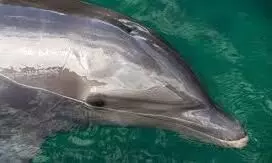
Lonely dolphin causes disturbance in Japanese beach town with attacks
text_fieldsA bottlenose dolphin, possibly separated from its pod, is believed to be behind a series of troubling attacks on swimmers in Tsuruga, a coastal town in Japan's Fukui Prefecture.
The most recent incident occurred on August 20, when a man in his 50s was bitten on both hands while trying to fend off the dolphin. This attack marks the 18th reported case since July 21, with two occurring within just two days.
Over the past three years, the region has witnessed more than 48 dolphin bite incidents, some of which have resulted in serious injuries, including broken bones.
While most of the bites have been minor, one recent case involved an elementary school child who required 20 to 30 stitches, according to coastguard official Shoichi Takeuchi. In response to the growing threat, beach staff have resorted to using water skis to coax the dolphin away from swimming areas. The Coast Guard has issued warnings about the increasing number of dolphin bites, noting that some previous incidents required more than 10 stitches.
Researchers suspect that a lonely male dolphin is responsible for these attacks.
The injuries on the dorsal fin of the dolphin involved in the latest incident match those of a dolphin spotted off the coast last year. Dorsal fins are unique to each dolphin, much like fingerprints in humans, which has led researchers to believe that the same individual is behind the attacks.
Tadamichi Morisaka, a researcher at the Cetacean Research Center at Japan's Mie University, has reviewed photographs and believes it is reasonable to conclude that the same dolphin is involved. Morisaka noted that the dolphin's behavior is unusual for bottlenose dolphins, which typically do not approach, interact with, or bite humans.
He suggested that the dolphin may have grown accustomed to human interaction over the years, leading to its current behavior. In a statement to NBC News, Morisaka mentioned that the dolphin may be seeking interaction with humans due to loneliness rather than intending to harm them.
Elizabeth Hawkins, Chief Executive and Founding Director of Dolphin Research Australia, supported this theory, suggesting that the dolphin might be a "sociable solitary dolphin" that has become isolated. Hawkins explained that socially isolated dolphins can become pushy, aggressive, and prone to biting. She emphasized the importance of giving the dolphin space to prevent further incidents.
Local officials are closely monitoring the dolphin's behavior and continue to advise caution for those entering the water. As the situation evolves, efforts are being made to ensure both the safety of beachgoers and the well-being of the dolphin.























